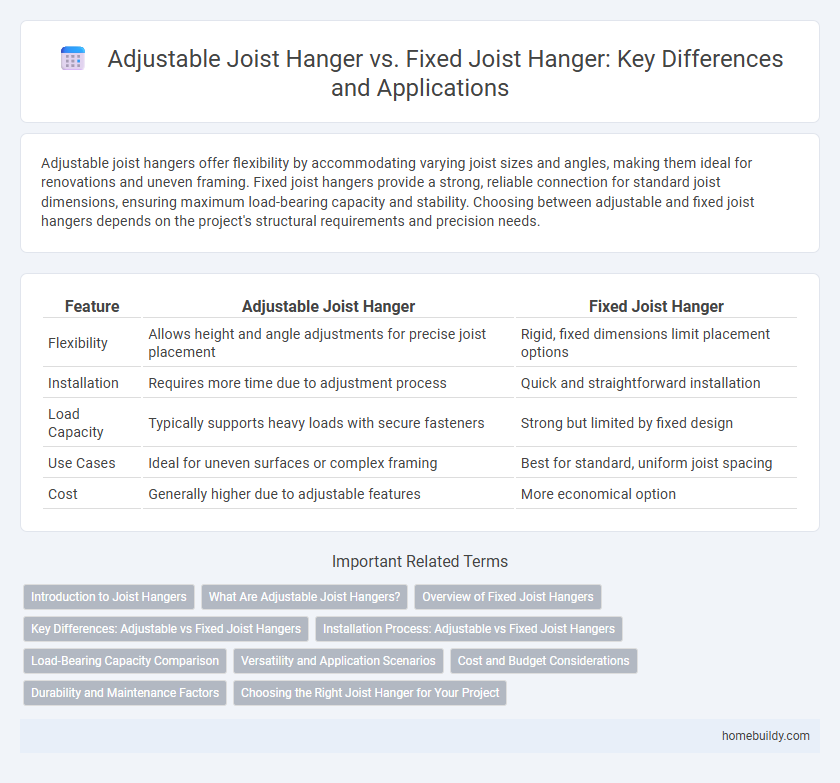Adjustable joist hangers offer flexibility by accommodating varying joist sizes and angles, making them ideal for renovations and uneven framing. Fixed joist hangers provide a strong, reliable connection for standard joist dimensions, ensuring maximum load-bearing capacity and stability. Choosing between adjustable and fixed joist hangers depends on the project's structural requirements and precision needs.
Table of Comparison
| Feature | Adjustable Joist Hanger | Fixed Joist Hanger |
|---|---|---|
| Flexibility | Allows height and angle adjustments for precise joist placement | Rigid, fixed dimensions limit placement options |
| Installation | Requires more time due to adjustment process | Quick and straightforward installation |
| Load Capacity | Typically supports heavy loads with secure fasteners | Strong but limited by fixed design |
| Use Cases | Ideal for uneven surfaces or complex framing | Best for standard, uniform joist spacing |
| Cost | Generally higher due to adjustable features | More economical option |
Introduction to Joist Hangers
Joist hangers are essential hardware components used to support wooden joists in construction, ensuring structural stability and load distribution. Adjustable joist hangers offer flexibility by accommodating various joist sizes and angles, making them ideal for irregular framing or retrofit projects. Fixed joist hangers provide a robust, permanent connection designed for consistent joist dimensions, delivering reliable support in standard framing applications.
What Are Adjustable Joist Hangers?
Adjustable joist hangers are metal connectors designed to provide flexible support for joists with varying angles and heights, allowing precise alignment during deck or floor framing. Unlike fixed joist hangers, they feature movable parts or adjustable screws that accommodate dimensional changes, ensuring stability and easier installation in non-standard or uneven constructions. These hangers enhance structural integrity by enabling customizable fit, reducing gaps and minimizing the risk of joist misalignment.
Overview of Fixed Joist Hangers
Fixed joist hangers provide a strong, stable connection by securing joists at a set angle without movement, ensuring consistent alignment and load distribution. They are typically made from galvanized steel to resist corrosion and are ideal for standard framing where joist positions are predetermined. Fixed joist hangers offer high shear strength and are commonly used in residential and commercial construction for floors, decks, and ceilings.
Key Differences: Adjustable vs Fixed Joist Hangers
Adjustable joist hangers offer flexibility in length to accommodate varying joist sizes and uneven framing, making them ideal for custom or irregular applications. Fixed joist hangers provide a solid, pre-sized connection designed for standard joist dimensions, ensuring a strong, consistent fit in uniform framing. The key difference lies in adaptability versus stability, with adjustable hangers allowing on-site modifications, while fixed hangers deliver maximum load support without the need for adjustment.
Installation Process: Adjustable vs Fixed Joist Hangers
Adjustable joist hangers offer a versatile installation process by allowing precise alignment and height adjustments during framing, reducing measurement errors and rework. Fixed joist hangers require exact pre-measurements and positioning, making installation quicker but less forgiving to on-site discrepancies. Choosing between adjustable and fixed hangers depends on project complexity and the need for customization versus speed.
Load-Bearing Capacity Comparison
Adjustable joist hangers offer variable load-bearing capacities depending on their size and adjustment range, typically supporting between 500 to 2,000 pounds, making them versatile for uneven or angled joists. Fixed joist hangers provide consistent and higher load-bearing strength, often exceeding 2,500 pounds, due to their rigid, non-movable design optimized for standard joist applications. Engineers recommend fixed joist hangers for maximum structural stability in heavy load scenarios, while adjustable types suit flexible framing requirements with moderate loads.
Versatility and Application Scenarios
Adjustable joist hangers offer enhanced versatility by accommodating various joist sizes and angles, making them ideal for projects requiring flexibility such as irregular framing or renovations. Fixed joist hangers provide a solid, reliable connection for standard, repetitive joist spacing in new construction where uniformity is crucial. Choosing between adjustable and fixed joist hangers depends on the specific application scenario, balancing adaptability with structural consistency.
Cost and Budget Considerations
Adjustable joist hangers typically cost more than fixed joist hangers due to their versatile design, impacting overall project budgets. Fixed joist hangers are a cost-effective option for straightforward applications where precise adjustments are unnecessary. Budget-conscious builders often choose fixed hangers to minimize expenses while ensuring structural integrity.
Durability and Maintenance Factors
Adjustable joist hangers offer enhanced flexibility for installation, but their multiple moving parts may require more frequent inspections and maintenance to ensure long-term durability. Fixed joist hangers, constructed from solid, robust steel, generally provide superior structural strength and lower maintenance needs due to their simpler design. Choosing between adjustable and fixed joist hangers depends on balancing the need for adaptability with the desire for long-lasting, low-maintenance support in decking or framing projects.
Choosing the Right Joist Hanger for Your Project
Selecting the right joist hanger depends on the specific project requirements and structural demands. Adjustable joist hangers offer flexibility for uneven or variable joist sizes, ensuring a secure fit and easier alignment during installation. Fixed joist hangers provide maximum stability and strength for uniform joist dimensions, making them ideal for standard framing projects where precision and load capacity are critical.
Adjustable joist hanger vs fixed joist hanger Infographic

 homebuildy.com
homebuildy.com